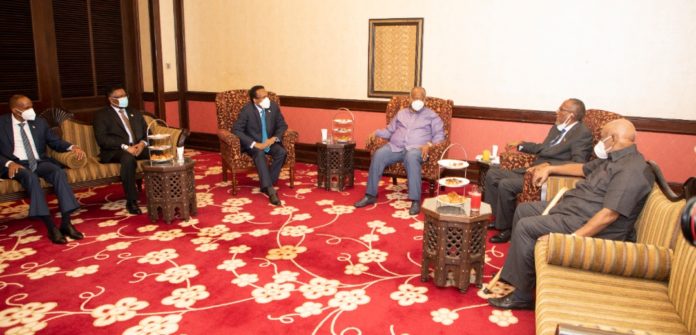When the Foreign Minister of Somaliland, Yasin Faratoon, mentioned the first official meeting between Somali President Mohamed Abdullahi Farmaajo and his Somaliland counterpart Muse Bihi Abdi in February, there was speculation about its purpose. Organised originally through the mediation of Ethiopian Prime Minister Abiy Ahmed in Addis Ababa, we were then surprised by another conference held a few days ago in Djibouti. What are the reasons for these discussions?
The importance of having fresh talks between the two Somalias is agreed by everyone in the West, given that it is not in its best interest for Somalia to be split into North and South. Such a split could lead to Russia or China seizing the opportunity to support one side against the other. This is what Russia has done in Libya for the sake of oil, helping Khalifa Haftar’s forces with weapons and mercenaries and thus making itself a significant party in Libyan politics. For the West, it is time for Somalia to be united as a single state in order to reach major petroleum deals and continue to exercise its influence in this strategically-important area.
The evidence for this is that America was determined for the Djibouti conference to be a success. It was included in the technical consultative committees formed by the two parties to follow up on negotiations and reach a sustainable solution. All of the so-called international partners of Somalia signed a statement which was published by Britain a few days ago, supporting and encouraging these committees, most of which were comprised of representatives of European countries as well as the US.
Ethiopia was also interested in the success of the conference to accelerate agreements it has with Somalia to use the latter’s ports and facilitate major economic, tourism and trade projects. It wanted to succeed alongside a united Somalia in its conflict with Egypt over the Renaissance Dam Project; the reservoirs behind the dam are due to start filling from 1 July. Hence, Addis Ababa is constantly seeking was for its inspirational, Abiy Ahmed — a Nobel Peace Laureate — to have diplomatic successes in the Horn of Africa. That is why it used its influence to make this a positive meeting.
As one of the most important offshore oil areas off East Africa, there is interest in Somali from major oil and gas companies. The Somali government has launched its first promotional round to grant exploration licences in seven offshore zones. However, Somalia cannot sell oil on the international market while it remains divided, so it is in its best interests to open constructive negotiations and solve the problems that have been festering for three decades.
The International Monetary Fund and the World Bank, meanwhile, have agreed to reduce the debt burdening Somalia from $5.2 billion to about $557 million. Somalia is also being given new funding over three years amounting to $395 million. This is conditional upon Somalia starting fresh talks with Somaliland.
Although the four-day conference stumbled on a sensitive clause from Somaliland’s independence related to the ability to move freely between the two parts of the territory, to save face the Foreign Minister of Djibouti, Mahmoud Ali Youssef, intervened to sign four conciliatory documents. The most important of these was to continue negotiations and form other technical committees to bring views closer.
The world welcomed these fresh talks for its own sake, while the Arab League welcomed the move through its Secretary General, Ahmed Aboul Gheit, albeit belatedly. However, those who felt the most joy at the resumption of the negotiations were the Somali people who have suffered from the division. Hopefully, these talks will be a successful new beginning and will bear harmonious fruits for both parties in the near future.
Abdulrahman Hadana






































